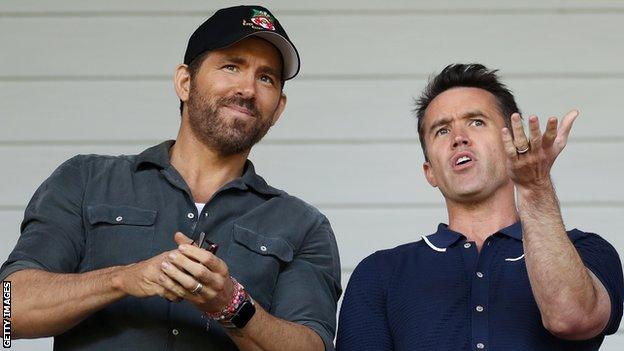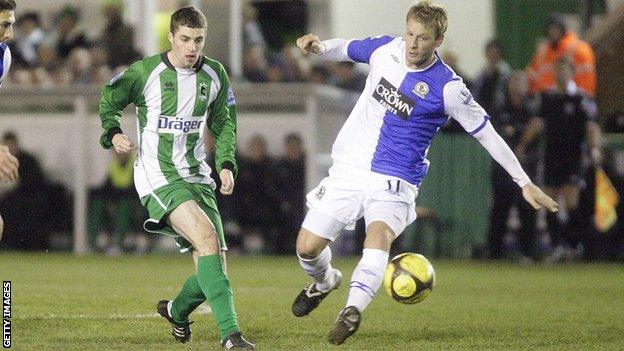FA Cup: Blyth Spartans of National League North aim to write Hollywood chapter in cup history
- Published

Blyth Spartans face Wrexham, owned by Hollywood actors Ryan Reynolds (left) and Rob McElhenney, in a repeat of their famous 1978 FA Cup clash
For many, the name Blyth Spartans immediately transports them back to 1978.
It was the men in the green and white of the non-league team from Northumberland taking the FA Cup by storm, seconds away from a quarter-final against the mighty Arsenal.
The team to thwart them in that first game and subsequently defeat them in a replay at Newcastle United's St James' Park was Wrexham.
Now 44 years on, the North Wales club stands between Blyth and a place in the FA Cup first round proper for the 32nd time in their storied history.
But this is a very different Wrexham, one with a touch of Hollywood glamour about them, thanks to having actors Ryan Reynolds and Rob McElhenney as the club's co-owners.
'Little old Blyth and Deadpool'
The arrival of Reynolds and McElhenney has produced a fly-on-the-wall documentary, and such is the interest in the Wrexham story across the Atlantic that Saturday's fourth-qualifying-round tie has been moved from 15:00 BST to 13:00 to accommodate live TV in the USA.
It has also sparked much excitement among the players and staff at Blyth, who are currently 21st in National League North.
"It's an unbelievable story with two Hollywood stars buying a club in Wales," midfielder JJ O'Donnell told BBC Look North.
"It's a bit surreal but I'm hoping they turn up for the game. Little old Blyth and Deadpool turning up to the ground!"
But for all the attention that now surrounds National League Wrexham, Phil Parkinson's side would be foolish to underestimate a club with such a proud FA Cup heritage.
"This was probably the toughest draw we could get, but it's a really big game and a big club coming to Croft Park," says manager Graham Fenton.
"Wrexham are a big scalp at this level. It's easy to bring budgets into it, but from what I'm hearing they are paying decent sums [in wages] which are way above most in League Two and even some League One clubs.
"Blyth has a magnificent history in the FA Cup, and when you sign for the club you're aware of that.
"I used to play golf with John Waterson, the captain of the 1978 team, so I know all about how unlucky they were not to make the quarter-finals.
"Then we had our run in 2009 when we brought Blackburn to Croft Park, external and we were unlucky not to take them to a replay.
"But we want to create our own history. The pressure is on them and we want to create an upset of our own."
'20,000 locked outside'
That run in 1977-78 saw Blyth knock out two league clubs on their way to setting up a tie at Wrexham in round five.
Leading 1-0 heading into stoppage time, Spartans were denied by an equaliser from a corner, which had been retaken three times.
Nine days later, both teams met for the replay on Tyneside on 27 February for an occasion never to be forgotten.
"The crowd was about 45,000," Ron Guthrie, a member of that Blyth team and an FA Cup winner with Sunderland in 1973, told BBC Look North.
"I remember speaking to the chief of police afterwards and he said that about 20,000 were locked outside. People were jumping over the walls and doing all sorts to get in.
"They [Wrexham] made it 2-0 in the first half - the second one was a great goal. Then Terry Johnson scored with about five minutes to go.
"We peppered their goal for the last five minutes, but we couldn't get the equaliser."
There was to be no fairytale match with the Gunners in the last eight, but the players did a lap of honour at the end of the game before heading back up to Blyth's clubhouse for a few drinks to acknowledge their memorable run.

Blyth reached the third round in 2009 only to lose narrowly to Premier League side Blackburn Rovers
Fenton, a former Premier League player with Aston Villa, Blackburn and Leicester, was at Blyth as player/assistant manager for that game with Blackburn 13 years ago, while there was another run to the third round in 2015 where they were narrowly beaten by Championship side Birmingham City.
And while the FA Cup may not have the prestige of its heyday, Fenton knows it still carries weight.
"At the top end, we know it is all about the Premier League and the Champions League," he says.
"But at this level, it is still absolutely important.
"Financially, it is a really good opportunity to win prize money going through the rounds. You can also bring in larger gates through the turnstiles and even gain some extra long-term supporters if you have a good, long run."

The champion of two courts ignored by the world: Ora Washington fought to make her name in racially segregated America
How is a jet engine made?: Go behind the scenes at the Rolls-Royce factory in Derby to find out
